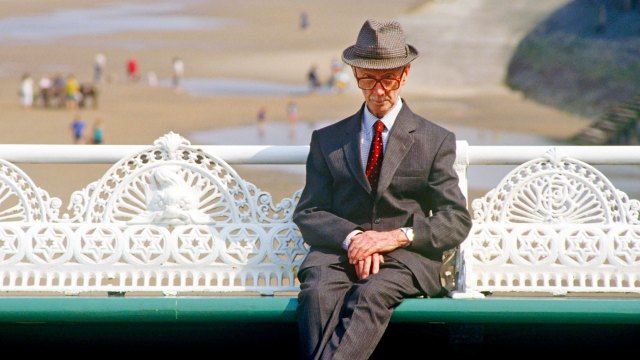Death used to be an expression of triumph (Pictures Ltd./Corbis via Getty Images)

Since the beginning of the twentieth century, life expectancy in the West has risen roughly three months per year. In 1900, a new-born child in the US would, on average, live to 47. Now it is about 79; by the end of the century, it will be 100.
Some will call this progress — in sanitation, diet, medicine — as if more is always better. But the cost of this “progress” is rarely factored in.
£12 billion every year is the latest pledge to fix health and social care, mostly for the elderly. But what are we doing with all these extra years?
It depends, of course. Some will work longer; some will have more time with their grandchildren and great grandchildren. Others will be warehoused in care homes, living out their twilight years amid the background smell of stale urine, bored ridged between monthly visits from their guilty children. Many are not like this, but a great deal of them still are. My mother has made us promise we will take her to Dignitas long before it comes to this — and that when we bring her ashes back from Switzerland it will be in a Harrods bag, not a Tesco one. This, apparently, is dignity in dying.
Social care has come a long way since it was conceived in alms houses provided by the church: through Victorian workhouses, state-funded provision in the twentieth century and, more recently, to profit-making private companies. As our population gets older, so the need for such services grows ever larger. It is commendable that the Government is seeking to address the growing cost of social care, albeit through a tax levy that falls disproportionately on the working poor and the young. But the one thing that we are not talking about — and our silence is becoming ruinously expensive — is what a good life, and indeed a good death, looks like.
To put it another way, without a sense of what human life is for, and what its basic natural or even theological rhythms might be, we fall back on the idea that more is always better. Without some sort of agreed understanding that human life exists within fundamental limits, society will inevitably find itself unsustainable.
The idea of growth, of always seeking more, is built into the very nature of capitalism, as it is within liberal progressivism. In a secular society, meaning tends to get replaced by the idea of more; or rather, more becomes the meaning.
It is not a coincidence that just as we are pouring billions into end-of-life care, the fantastically wealthy are seeking their own way of outwitting ageing and death. Amazon founder Jeff Bezos is now throwing his fortune at some comically ludicrous “eternal life” start-up that seeks to keep him alive forever. “Man plans, God laughs”, as the old Jewish proverb puts it. It’s not just that Bezos can’t succeed in this ridiculous vanity project, but that we shouldn’t want him too. Death, after all, gives life its purpose.
The philosopher Martha Nussbaum once asked why it was that the immortal Greek gods would often fall in love with mortal human beings; Calypso with Odysseus, for instance. Her insightful response was that those who can die are capable of things that immortals are not. They are, for example, capable of courage, of risking everything for others on the battlefield in a way that immortals cannot. Indeed, the very possibility of love itself is bound up with the ability to sacrifice oneself for another. A life without the possibility of death becomes some sort of meaningless extension of mere existence — the unbearable lightness of being.
This means that there is no way of solving the social care crisis in purely economic terms. Because one cannot address a metaphysical question through economic policy. Indeed, the very basic question of what human life is for is one that politicians, still less economists, no longer feel they have any use for.
The first stage to recover a basic metaphysical scaffolding would be to reclaim something of that story in which death has some sort of wider significance, rather than being viewed as just some anticlimactic end. Because if having more — going on longer — is the meaning of life in a secular society, then death is inevitably and always some sort of failure. Whereas we would once have said of the dead that they have passed into glory, we now hear the medics apologise that “there was nothing that we could do”. Death was once — potentially, at least — an expression of some ultimate triumph. Now it is the bitter failure of our technology. And whatever we spend on it, no amount of money will overcome this gap.
Death, then, is the political issue we are not talking about. Even after the pandemic, when the daily death figures were broadcast on every news broadcast, we continue to say little about death other than making the uncritical assumption it is always to be avoided.
And so we are sleepwalking into a state of affairs in which the young will resent the elderly for the burden they place upon them. Of course, we should support the generous funding for social care. What we ought to be challenging is whether the medical technologies that are keeping us alive for ever longer complement our understanding of what human existence is for.
But I see little appetite for that. In a secular society, we have few intellectual or cultural resources to challenge the pervasiveness of more-ism. And to live deeper, more meaningful lives is not the same as living longer ones.










Join the discussion
Join like minded readers that support our journalism by becoming a paid subscriber
To join the discussion in the comments, become a paid subscriber.
Join like minded readers that support our journalism, read unlimited articles and enjoy other subscriber-only benefits.
Subscribe